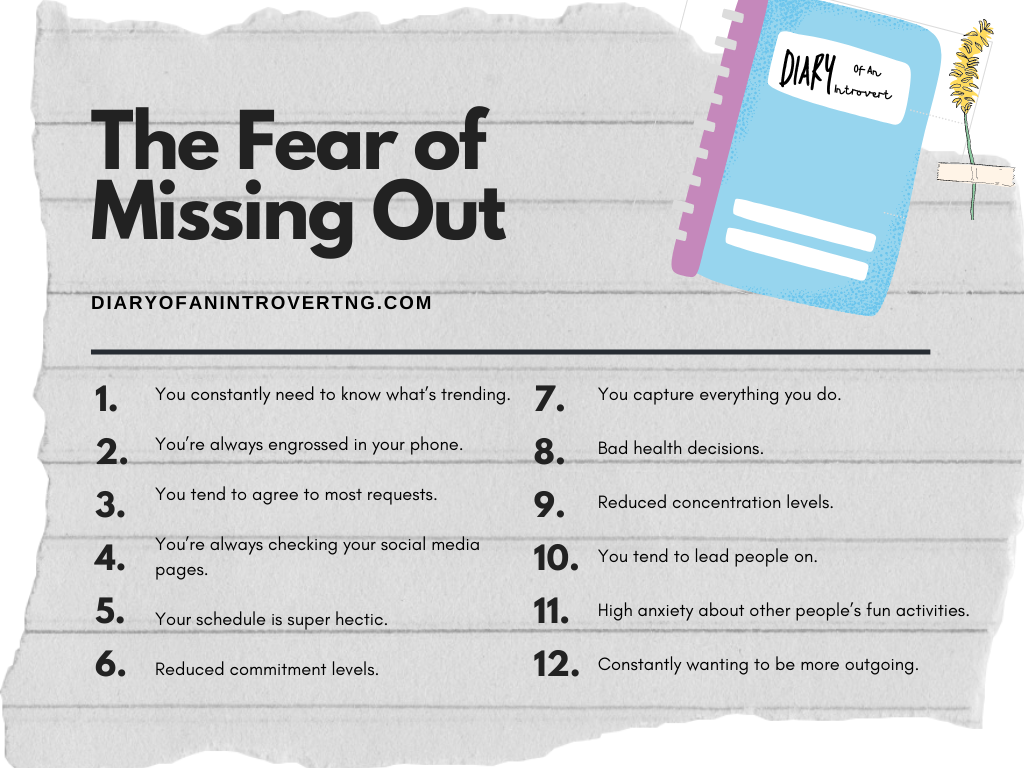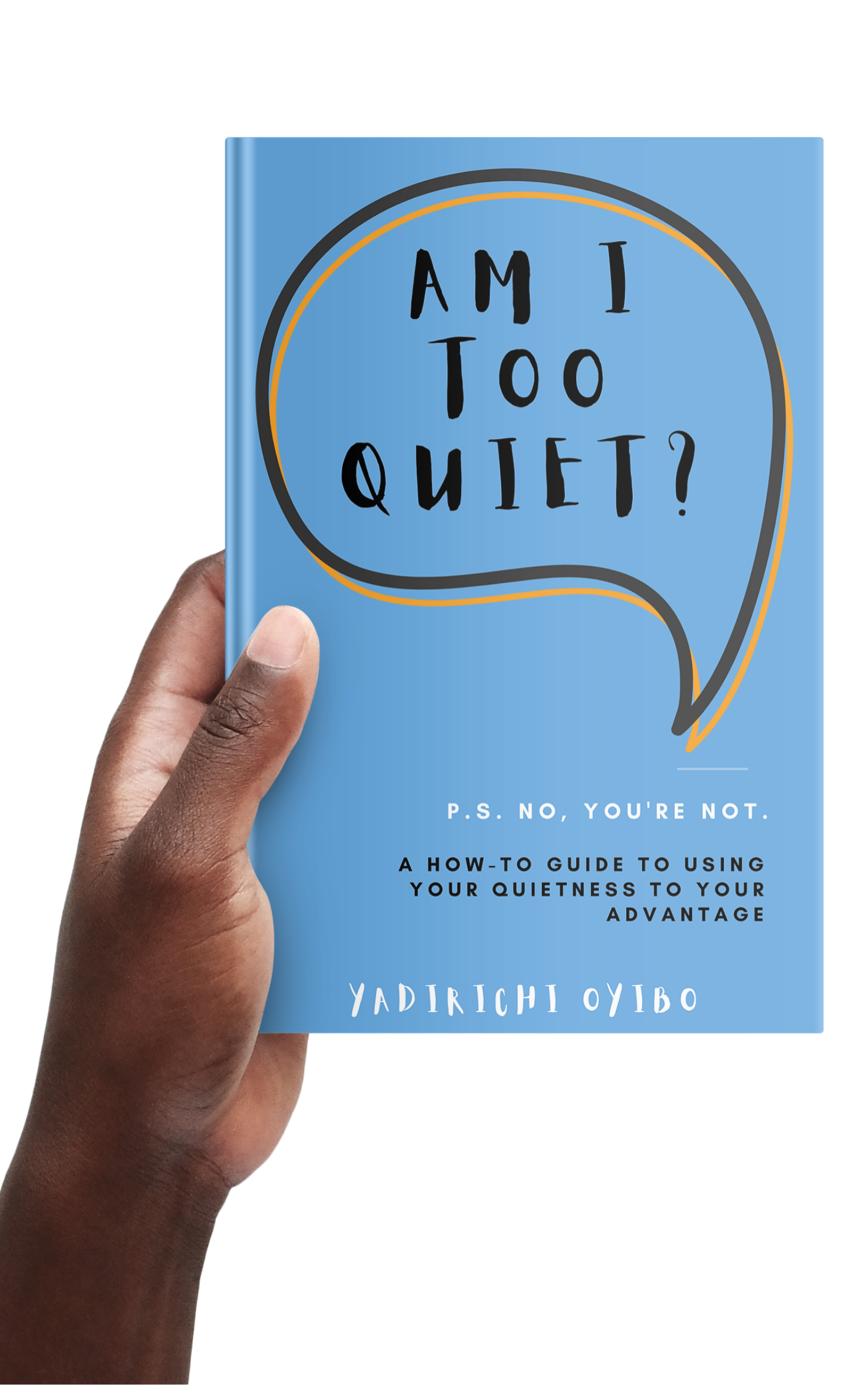How to Spot Your Introvert Fear of Missing Out (& Ways to Handle It)
Photo by Ethan Rougon on Unsplash
What is the Fear of Missing Out?
The fear of missing out definition, or the meaning of FOMO is the ‘constant feeling of missing something’. It doesn’t necessarily pertain to wanting something better for your future, but an agitation that you might be left out on something exciting happening at the moment.
Some fear of missing out examples include getting agitated that you aren’t invited to a party, or getting angry when you find out your friends are having a better weekend than you.
For an introvert, fear of missing out is feeling too limited as a quiet person or wanting to be more outgoing like most people.
The fear of missing out phobia name, FOMO, is increasingly common in today’s age. Many people are unsatisfied with their lives merely because of what they see others doing. This fixation isn’t healthy because it comes from a place of discontentment and not a sense of self-development.
It will also surprise you to know that the FOMO meaning isn’t a new term as it was coined years back. In this FOMO article, we’ll look at the science behind it, signs you might be having it, and how to cure the syndrome.
The Science Behind the Fear of Missing Out
The fear of missing out research began many decades ago by a marketing strategist Dr. Dan Herman. He was the one that put the words ‘fear of missing out’ together as we have it today. However, this syndrome wasn’t as obvious in previous eras as it is now.
People might wonder, “The fear of missing out FOMO, is it real or not?” According to statistics, the advent of social media makes the fear of missing out syndrome more glaring. FOMO social media statistics prove that people constantly compare their lives to others through the lens of the highlights they post online.
More so, the fear of missing out social media caused was because most people analyzed others’ lives from the comfort of their homes or when they weren’t actively engaged in activities. Thus, they’re bound to feel like they’re missing out on something.
The Dangers
The fear of missing out scale is increasingly rampant amongst adolescents with girls having a higher level of depression, and guys experiencing more anxiety. The FOMO disorder also leads to even more social network usage. This scenario occurs because the more people try to find a cure is the more they unknowingly compare their lives to others’ livelihood.
According to another research, the fear of missing out psychology isn’t age-restricted. It can happen to anyone as long as they unconsciously have a higher smartphone or social media usage. Overly evaluating others’ achievements can negatively affect a person’s mood or instill negative and obsessive behaviors. This dilemma can even cause a FOMO mental health crisis.
12 Signs you have FOMO (fear of missing out)
Photo by Mahdi Chaghari on Unsplash
You constantly need to know what’s trending.
The fear of missing out psychology involves several other factors apart from social media. For example, constantly wanting to know the trending songs and movies could indicate an increase in FOMO. As long as your interest is obsessively and unhealthily into what a greater portion of the population is doing, it reveals you have FOMO.
It could also be a frantic desire to find new things before they get too popular so that people will think you’re cool for knowing them. If your actions are done because of what others will say about you, then you might have FOMO.
2. You’re always engrossed in your phone.
You’ll notice that your fear of missing out FOMO is getting severe when you can’t seem to do anything without your phone. You unconsciously don't want to experience anything in real-time or have physical encounters. Instead, you’d prefer to have them on your phone. In some cases, having an app for everything can showcase your over dependence on your cellphone.
This habit can alter your perception of life. Although tasks are much easier to accomplish digitally, some experiences demand a person’s physical presence. It’s possible to jeopardize your authentic self and become more obsessive about things you can’t have if you spend so much time in a virtual world.
3. You tend to agree to most requests.
If you have the fear of missing out anxiety, you’ll unconsciously agree to everything that people suggest to you. You’ll want to be a part of everything happening around you, which will put you into a frantic situation. If people realize that you’re easily swoon, you can become more of a pushover. In short, always saying ‘yes’ will make you seem gullible.
It’s crucial to stand your ground and know what you want for yourself. Working towards curing your FOMO can help you be more independent despite what’s happening around you. More so, it’ll help you make more genuine connections than you used to.
Related: Am I Too Quiet? P.S. No, You’re Not. A How-To Guide to Using Your Introversion to Your Advantage
4. You’re always checking your social media pages.
Except you have something important to accomplish online, it’s never healthy to hop from one social networking app to another. More so, if the only thing you do is to refresh your feeds, hoping to see something that excites you, then you might have the FOMO social media anxiety.
The more you place your happiness on what you see online, the less you appreciate what’s happening around you. By the time you’re done scrolling, you’d unconsciously wish you had more exciting things happening in your life, which isn’t a healthy way to think. Knowing when to practice downtime is crucial for your mental health.
5. Your schedule is super hectic.
A major FOMO psychology is wanting to do as many things as possible to avoid missing out on the buzzing events. This could mean agreeing to go to places you’re not interested in, or signing up for events even when you know you’ll be too busy to attend. For people with this phobia, they tend to ignore their daily lives while trying to seek superficial pleasures.
Even if their bodies gets exhausted, they’d push through all odds to be in tune with they think might excite them. The consciousness that they might be losing out on something makes them neglect most of their physical demands.
6. Reduced commitment levels.
Since the fear of missing out phobia makes a person extensively preoccupied, it can lead to lesser commitment levels in the long run. When people can’t keep up with their schedules and have a habit of signing up for multiple events, it’d cause them to fall back on many plans.
According to statistics, it’s also the reason why people have reduced satisfaction levels in life. They are committing to things they have little to no interest in and can’t get gratification from it. Therefore, FOMO tends to reduce your likelihood of sticking to something and truly enjoying it.
7. You capture everything you do.
Another fear of missing out disorder example is when you’re more immersed in capturing a moment than actually enjoying it. You often fear that others might not see how amazing an experience is. And so, you prefer to record or take pictures while everything is happening.
It’s normal to capture moments once in a while but when it becomes a perpetual habit, it raises concern. You shouldn’t be more interested in what other people think about an incident than how you feel about it. This behavior might hint that you prefer others’ validation to yours, which is more or less a problem.
8. Bad health decisions.
The fear of missing out can cause many to make poor health decisions. For example, neglecting their fatigue to attend an event that means little to nothing to them. It could also be having sleeping challenges due to the hectic schedule they heap on themselves. If your activities aren’t productive, but you’re having a great increase in stress, you might have FOMO.
More so, if you’re more engrossed with how your actions satisfy others than paying attention to what your body needs per time, then you have this syndrome. It also shows that your well-being isn’t as important as keeping up with several casual activities.
9. Reduced concentration levels.
Another case of FOMO is lower concentration levels. Since some individuals can get caught up in living a casual life, they rarely enjoy the present one they have. This process can lead them to regular distracted thoughts, presumably about all the things they’re missing out on.
Research also shows that this behavior could lead to distracted driving, which can be deadly to the individuals involved. If you tend to focus on the events and experiences you could be having instead of living in the moment, it shows you might have FOMO.
10. You tend to lead people on.
If you have a fear of missing out, relationships will be something you hold on to, even though they might not be profitable to you. For example, when you’re in a healthy relationship, you might feel the need to keep others in line just in case the present association falls apart.
Even if you have nothing in common with these people, you feel more comfortable having backup associations. You might not be ready to invest in the association yet, but you’re pleased with the idea of having these people around. This situation can get toxic fast, especially if you have friends that you don’t want to communicate with, but you want them to stick around.
11. High anxiety about other people’s fun activities.
Having a FOMO addiction can make you anxious or depressed when you see other people having more fun than you are. You’ll instantly feel that your life is unexciting and that you need to do more. This fear of missing out stems from categorizing your idea of fun with how others do it.
Even though you might be engaging in all the things that excite you, those feelings quickly shatter when you see how others define their fun. Therefore, gauging your happiness from the wrong source can affect your mood negatively, or even put you in a bad mental state.
12. Constantly wanting to be more outgoing.
The FOMO Syndrome can greatly affect introverts because they’re on the verge of condemnation due to their quiet qualities. This scenario can cause them to desire a more outgoing lifestyle while neglecting their subtle strengths. If you find yourself trying too hard to be like others, you might have the FOMO syndrome.
It’s crucial to understand that your definition of fun doesn’t have to match others’ ideas of excitement. You should focus on engaging in profitable activities that will activate your hidden strengths, even if it’s as simple as reading a great book on a cozy evening. More so, never be afraid to be you despite what others might think.
Liking this article? Join our Introvert Club→
How to Stop The FOMO
Photo by Christophe Meyer on Unsplash
Can we be real about how this feels? Having a fear of missing out can make your life look colorless even when it’s not. Most people with severe FOMO also admit that they often resort back to social media to cure it, but it ironically only aggravates it.
The FOMO cure is hidden in the little things you can do, which will guarantee living a happy and free life. Having a fear of missing out book or fear of missing out quotes to read every day is great, but making little practical changes can go a longer way. Thankfully, we’ve listed down a few things for you.
Change your feed.
The best fear of missing out cure is switching up your feed to help you have a better perspective of life. You need to observe what triggers your FOMO and work towards curbing it online.
For example, if your feed contains people that brag about material possessions, and it often makes you feel left out, you should click the not interested button, or hit the unfollow or delete button. Sometimes, FOMO can happen in real-time, which means you might also need to unfriend some braggarts around you.
The more you associate with positive things, especially anything that will help you grow and increase your gratitude, the better you can cure your FOMO.
2. Redirect your energy.
If you focus your energy online - a space where nothing is physically accessible to you - you’re bound to trigger your FOMO. Therefore, it’s more profitable to focus on physical things.
Understand that your FOMO can either increase or reduce depending on the lens you see the world from. An example is having an awesome experience you want to share with people.
You can post several pictures online but might get disappointed when others don’t approve of it as you expected. Instead of seeking external validation for something you know is amazing, you can create physical frames of the memories and constantly relish in those moments.
3. Make real connections.
If you often experience a deep sense of loneliness online, it could hint at wanting a profound connection with someone. Most times, a like on your post doesn’t bring enough gratification as bonding with a real-life person. This is often because likes on social media are never enough. Instead of fixating on a number, you can choose to experience something more substantial.
Meeting up with a close friend or loved one in person, instead of hiding behind online conversations can indeed fill a void in your life. You’ll also notice how less agitated you’ll feel about getting approval online.
4. Remain grateful.
Keeping a journal about the amazing things in your life can help you feel lighter and happier. It can also drastically reduce your social media usage. Write them in sticky notes to constantly remind yourself why you should be grateful. More so, try practicing giving others compliments or surprising your friends and loved ones with gifts.
Making others feel happy will have a ripple effect on your mood. It’ll create a vibrant atmosphere that will help you to appreciate the good things in life. You might be tempted to share your achievements online, but be careful not to put your joy on others’ validations.
5. Change your mindset.
Most people tend to conclude that others are better off because of what they see online. This mindset is what nurtures the fear of missing out. It’s crucial to understand that no one has it all together, especially those who brag about their accomplishments.
For most introverts, it’s easy to feel left out or that there’s something wrong with you. Nevertheless, focusing on the little things that make you amazing can help you repel the idea of inferiority. You’ll also understand that you’re just as amazing as the next person.
FAQs
What is fear of missing out?
The fear of missing out meaning is feeling anxious that others have more exciting lives than you do and are better off. This mindset comes with a deep sense of inferiority, where the individual can't help but compare themselves with other people.
Why is FOMO bad?
The reason why FOMO is bad is that it damages your self-esteem and prevents you from appreciating all life has to offer. The more you feel like you’re missing out on something, the more you enter into negative cycles that might be detrimental to you and others around.
What’s FOMO?
The FOMO definition is a strong belief that others are doing better than you. People with this syndrome tend to suffer from anxiety or depression because they can’t measure up to others’ lives. They also constantly seek external validation for all their accomplishments because their happiness unconsciously lies in what others think about them.
What does FOMO stand for?
A fear acronym for anxiety is FOMO, which is the fear of missing out. The phomo meaning is believing your life isn’t exciting and that you need to make certain changes to fix it. Some of these activities can include getting overly engrossed with social media, which ironically, would only increase your desire to measure up.
Do I have FOMO?
You can know you have the fear of missing out phobia is if you constantly compare your life to others. More so, you feel you’re not as outgoing as others, and you’re constantly missing out on the fun things that life has to offer. If you can’t seem to appreciate all the great things presently in your life, you indeed have this syndrome.
Live Your Best Quiet Life
Get the Am I Too Quiet? book →
CONCLUSION
Was this article insightful? Remember that your road to recovery might come with a fear of getting better. You might feel that neglecting what others are doing only makes you miss out more, but it doesn’t. It makes you stronger and more in control of your life than you think. Kindly leave a comment below or share this article if you liked it.
















